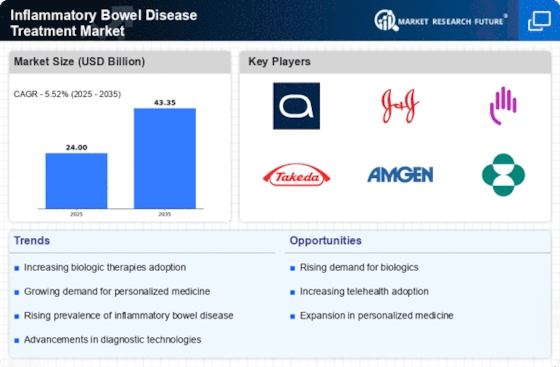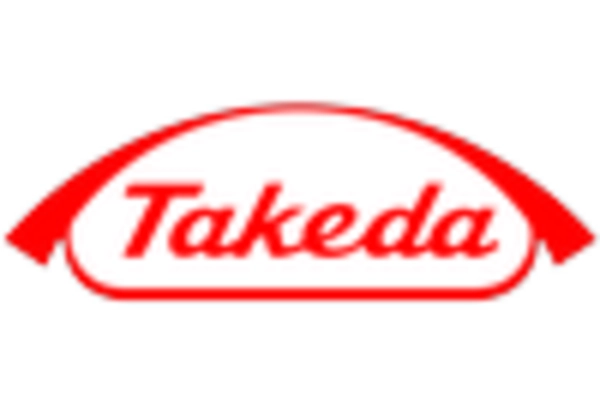Aminosalicylates
Corticosteroids
Immunomodulators
Biologics
Antibiotics
Oral
Injectable
Topical
Ulcerative Colitis
Crohn's Disease
Hospitals
Ambulatory Surgical Centers
Homecare Settings
North America
Europe
South America
Asia Pacific
Middle East and Africa
North America Outlook (USD Billion, 2019-2035)
North America Inflammatory Bowel Disease Treatment Market by Drug Type
Aminosalicylates
Corticosteroids
Immunomodulators
Biologics
Antibiotics
North America Inflammatory Bowel Disease Treatment Market by Route of Administration Type
Oral
Injectable
Topical
North America Inflammatory Bowel Disease Treatment Market by Disease Type
Ulcerative Colitis
Crohn's Disease
North America Inflammatory Bowel Disease Treatment Market by End User Type
Hospitals
Ambulatory Surgical Centers
Homecare Settings
North America Inflammatory Bowel Disease Treatment Market by Regional Type
US
Canada
US Outlook (USD Billion, 2019-2035)
US Inflammatory Bowel Disease Treatment Market by Drug Type
Aminosalicylates
Corticosteroids
Immunomodulators
Biologics
Antibiotics
US Inflammatory Bowel Disease Treatment Market by Route of Administration Type
Oral
Injectable
Topical
US Inflammatory Bowel Disease Treatment Market by Disease Type
Ulcerative Colitis
Crohn's Disease
US Inflammatory Bowel Disease Treatment Market by End User Type
Hospitals
Ambulatory Surgical Centers
Homecare Settings
CANADA Outlook (USD Billion, 2019-2035)
CANADA Inflammatory Bowel Disease Treatment Market by Drug Type
Aminosalicylates
Corticosteroids
Immunomodulators
Biologics
Antibiotics
CANADA Inflammatory Bowel Disease Treatment Market by Route of Administration Type
Oral
Injectable
Topical
CANADA Inflammatory Bowel Disease Treatment Market by Disease Type
Ulcerative Colitis
Crohn's Disease
CANADA Inflammatory Bowel Disease Treatment Market by End User Type
Hospitals
Ambulatory Surgical Centers
Homecare Settings
Europe Outlook (USD Billion, 2019-2035)
Europe Inflammatory Bowel Disease Treatment Market by Drug Type
Aminosalicylates
Corticosteroids
Immunomodulators
Biologics
Antibiotics
Europe Inflammatory Bowel Disease Treatment Market by Route of Administration Type
Oral
Injectable
Topical
Europe Inflammatory Bowel Disease Treatment Market by Disease Type
Ulcerative Colitis
Crohn's Disease
Europe Inflammatory Bowel Disease Treatment Market by End User Type
Hospitals
Ambulatory Surgical Centers
Homecare Settings
Europe Inflammatory Bowel Disease Treatment Market by Regional Type
Germany
UK
France
Russia
Italy
Spain
Rest of Europe
GERMANY Outlook (USD Billion, 2019-2035)
GERMANY Inflammatory Bowel Disease Treatment Market by Drug Type
Aminosalicylates
Corticosteroids
Immunomodulators
Biologics
Antibiotics
GERMANY Inflammatory Bowel Disease Treatment Market by Route of Administration Type
Oral
Injectable
Topical
GERMANY Inflammatory Bowel Disease Treatment Market by Disease Type
Ulcerative Colitis
Crohn's Disease
GERMANY Inflammatory Bowel Disease Treatment Market by End User Type
Hospitals
Ambulatory Surgical Centers
Homecare Settings
UK Outlook (USD Billion, 2019-2035)
UK Inflammatory Bowel Disease Treatment Market by Drug Type
Aminosalicylates
Corticosteroids
Immunomodulators
Biologics
Antibiotics
UK Inflammatory Bowel Disease Treatment Market by Route of Administration Type
Oral
Injectable
Topical
UK Inflammatory Bowel Disease Treatment Market by Disease Type
Ulcerative Colitis
Crohn's Disease
UK Inflammatory Bowel Disease Treatment Market by End User Type
Hospitals
Ambulatory Surgical Centers
Homecare Settings
FRANCE Outlook (USD Billion, 2019-2035)
FRANCE Inflammatory Bowel Disease Treatment Market by Drug Type
Aminosalicylates
Corticosteroids
Immunomodulators
Biologics
Antibiotics
FRANCE Inflammatory Bowel Disease Treatment Market by Route of Administration Type
Oral
Injectable
Topical
FRANCE Inflammatory Bowel Disease Treatment Market by Disease Type
Ulcerative Colitis
Crohn's Disease
FRANCE Inflammatory Bowel Disease Treatment Market by End User Type
Hospitals
Ambulatory Surgical Centers
Homecare Settings
RUSSIA Outlook (USD Billion, 2019-2035)
RUSSIA Inflammatory Bowel Disease Treatment Market by Drug Type
Aminosalicylates
Corticosteroids
Immunomodulators
Biologics
Antibiotics
RUSSIA Inflammatory Bowel Disease Treatment Market by Route of Administration Type
Oral
Injectable
Topical
RUSSIA Inflammatory Bowel Disease Treatment Market by Disease Type
Ulcerative Colitis
Crohn's Disease
RUSSIA Inflammatory Bowel Disease Treatment Market by End User Type
Hospitals
Ambulatory Surgical Centers
Homecare Settings
ITALY Outlook (USD Billion, 2019-2035)
ITALY Inflammatory Bowel Disease Treatment Market by Drug Type
Aminosalicylates
Corticosteroids
Immunomodulators
Biologics
Antibiotics
ITALY Inflammatory Bowel Disease Treatment Market by Route of Administration Type
Oral
Injectable
Topical
ITALY Inflammatory Bowel Disease Treatment Market by Disease Type
Ulcerative Colitis
Crohn's Disease
ITALY Inflammatory Bowel Disease Treatment Market by End User Type
Hospitals
Ambulatory Surgical Centers
Homecare Settings
SPAIN Outlook (USD Billion, 2019-2035)
SPAIN Inflammatory Bowel Disease Treatment Market by Drug Type
Aminosalicylates
Corticosteroids
Immunomodulators
Biologics
Antibiotics
SPAIN Inflammatory Bowel Disease Treatment Market by Route of Administration Type
Oral
Injectable
Topical
SPAIN Inflammatory Bowel Disease Treatment Market by Disease Type
Ulcerative Colitis
Crohn's Disease
SPAIN Inflammatory Bowel Disease Treatment Market by End User Type
Hospitals
Ambulatory Surgical Centers
Homecare Settings
REST OF EUROPE Outlook (USD Billion, 2019-2035)
REST OF EUROPE Inflammatory Bowel Disease Treatment Market by Drug Type
Aminosalicylates
Corticosteroids
Immunomodulators
Biologics
Antibiotics
REST OF EUROPE Inflammatory Bowel Disease Treatment Market by Route of Administration Type
Oral
Injectable
Topical
REST OF EUROPE Inflammatory Bowel Disease Treatment Market by Disease Type
Ulcerative Colitis
Crohn's Disease
REST OF EUROPE Inflammatory Bowel Disease Treatment Market by End User Type
Hospitals
Ambulatory Surgical Centers
Homecare Settings
APAC Outlook (USD Billion, 2019-2035)
APAC Inflammatory Bowel Disease Treatment Market by Drug Type
Aminosalicylates
Corticosteroids
Immunomodulators
Biologics
Antibiotics
APAC Inflammatory Bowel Disease Treatment Market by Route of Administration Type
Oral
Injectable
Topical
APAC Inflammatory Bowel Disease Treatment Market by Disease Type
Ulcerative Colitis
Crohn's Disease
APAC Inflammatory Bowel Disease Treatment Market by End User Type
Hospitals
Ambulatory Surgical Centers
Homecare Settings
APAC Inflammatory Bowel Disease Treatment Market by Regional Type
China
India
Japan
South Korea
Malaysia
Thailand
Indonesia
Rest of APAC
CHINA Outlook (USD Billion, 2019-2035)
CHINA Inflammatory Bowel Disease Treatment Market by Drug Type
Aminosalicylates
Corticosteroids
Immunomodulators
Biologics
Antibiotics
CHINA Inflammatory Bowel Disease Treatment Market by Route of Administration Type
Oral
Injectable
Topical
CHINA Inflammatory Bowel Disease Treatment Market by Disease Type
Ulcerative Colitis
Crohn's Disease
CHINA Inflammatory Bowel Disease Treatment Market by End User Type
Hospitals
Ambulatory Surgical Centers
Homecare Settings
INDIA Outlook (USD Billion, 2019-2035)
INDIA Inflammatory Bowel Disease Treatment Market by Drug Type
Aminosalicylates
Corticosteroids
Immunomodulators
Biologics
Antibiotics
INDIA Inflammatory Bowel Disease Treatment Market by Route of Administration Type
Oral
Injectable
Topical
INDIA Inflammatory Bowel Disease Treatment Market by Disease Type
Ulcerative Colitis
Crohn's Disease
INDIA Inflammatory Bowel Disease Treatment Market by End User Type
Hospitals
Ambulatory Surgical Centers
Homecare Settings
JAPAN Outlook (USD Billion, 2019-2035)
JAPAN Inflammatory Bowel Disease Treatment Market by Drug Type
Aminosalicylates
Corticosteroids
Immunomodulators
Biologics
Antibiotics
JAPAN Inflammatory Bowel Disease Treatment Market by Route of Administration Type
Oral
Injectable
Topical
JAPAN Inflammatory Bowel Disease Treatment Market by Disease Type
Ulcerative Colitis
Crohn's Disease
JAPAN Inflammatory Bowel Disease Treatment Market by End User Type
Hospitals
Ambulatory Surgical Centers
Homecare Settings
SOUTH KOREA Outlook (USD Billion, 2019-2035)
SOUTH KOREA Inflammatory Bowel Disease Treatment Market by Drug Type
Aminosalicylates
Corticosteroids
Immunomodulators
Biologics
Antibiotics
SOUTH KOREA Inflammatory Bowel Disease Treatment Market by Route of Administration Type
Oral
Injectable
Topical
SOUTH KOREA Inflammatory Bowel Disease Treatment Market by Disease Type
Ulcerative Colitis
Crohn's Disease
SOUTH KOREA Inflammatory Bowel Disease Treatment Market by End User Type
Hospitals
Ambulatory Surgical Centers
Homecare Settings
MALAYSIA Outlook (USD Billion, 2019-2035)
MALAYSIA Inflammatory Bowel Disease Treatment Market by Drug Type
Aminosalicylates
Corticosteroids
Immunomodulators
Biologics
Antibiotics
MALAYSIA Inflammatory Bowel Disease Treatment Market by Route of Administration Type
Oral
Injectable
Topical
MALAYSIA Inflammatory Bowel Disease Treatment Market by Disease Type
Ulcerative Colitis
Crohn's Disease
MALAYSIA Inflammatory Bowel Disease Treatment Market by End User Type
Hospitals
Ambulatory Surgical Centers
Homecare Settings
THAILAND Outlook (USD Billion, 2019-2035)
THAILAND Inflammatory Bowel Disease Treatment Market by Drug Type
Aminosalicylates
Corticosteroids
Immunomodulators
Biologics
Antibiotics
THAILAND Inflammatory Bowel Disease Treatment Market by Route of Administration Type
Oral
Injectable
Topical
THAILAND Inflammatory Bowel Disease Treatment Market by Disease Type
Ulcerative Colitis
Crohn's Disease
THAILAND Inflammatory Bowel Disease Treatment Market by End User Type
Hospitals
Ambulatory Surgical Centers
Homecare Settings
INDONESIA Outlook (USD Billion, 2019-2035)
INDONESIA Inflammatory Bowel Disease Treatment Market by Drug Type
Aminosalicylates
Corticosteroids
Immunomodulators
Biologics
Antibiotics
INDONESIA Inflammatory Bowel Disease Treatment Market by Route of Administration Type
Oral
Injectable
Topical
INDONESIA Inflammatory Bowel Disease Treatment Market by Disease Type
Ulcerative Colitis
Crohn's Disease
INDONESIA Inflammatory Bowel Disease Treatment Market by End User Type
Hospitals
Ambulatory Surgical Centers
Homecare Settings
REST OF APAC Outlook (USD Billion, 2019-2035)
REST OF APAC Inflammatory Bowel Disease Treatment Market by Drug Type
Aminosalicylates
Corticosteroids
Immunomodulators
Biologics
Antibiotics
REST OF APAC Inflammatory Bowel Disease Treatment Market by Route of Administration Type
Oral
Injectable
Topical
REST OF APAC Inflammatory Bowel Disease Treatment Market by Disease Type
Ulcerative Colitis
Crohn's Disease
REST OF APAC Inflammatory Bowel Disease Treatment Market by End User Type
Hospitals
Ambulatory Surgical Centers
Homecare Settings
South America Outlook (USD Billion, 2019-2035)
South America Inflammatory Bowel Disease Treatment Market by Drug Type
Aminosalicylates
Corticosteroids
Immunomodulators
Biologics
Antibiotics
South America Inflammatory Bowel Disease Treatment Market by Route of Administration Type
Oral
Injectable
Topical
South America Inflammatory Bowel Disease Treatment Market by Disease Type
Ulcerative Colitis
Crohn's Disease
South America Inflammatory Bowel Disease Treatment Market by End User Type
Hospitals
Ambulatory Surgical Centers
Homecare Settings
South America Inflammatory Bowel Disease Treatment Market by Regional Type
Brazil
Mexico
Argentina
Rest of South America
BRAZIL Outlook (USD Billion, 2019-2035)
BRAZIL Inflammatory Bowel Disease Treatment Market by Drug Type
Aminosalicylates
Corticosteroids
Immunomodulators
Biologics
Antibiotics
BRAZIL Inflammatory Bowel Disease Treatment Market by Route of Administration Type
Oral
Injectable
Topical
BRAZIL Inflammatory Bowel Disease Treatment Market by Disease Type
Ulcerative Colitis
Crohn's Disease
BRAZIL Inflammatory Bowel Disease Treatment Market by End User Type
Hospitals
Ambulatory Surgical Centers
Homecare Settings
MEXICO Outlook (USD Billion, 2019-2035)
MEXICO Inflammatory Bowel Disease Treatment Market by Drug Type
Aminosalicylates
Corticosteroids
Immunomodulators
Biologics
Antibiotics
MEXICO Inflammatory Bowel Disease Treatment Market by Route of Administration Type
Oral
Injectable
Topical
MEXICO Inflammatory Bowel Disease Treatment Market by Disease Type
Ulcerative Colitis
Crohn's Disease
MEXICO Inflammatory Bowel Disease Treatment Market by End User Type
Hospitals
Ambulatory Surgical Centers
Homecare Settings
ARGENTINA Outlook (USD Billion, 2019-2035)
ARGENTINA Inflammatory Bowel Disease Treatment Market by Drug Type
Aminosalicylates
Corticosteroids
Immunomodulators
Biologics
Antibiotics
ARGENTINA Inflammatory Bowel Disease Treatment Market by Route of Administration Type
Oral
Injectable
Topical
ARGENTINA Inflammatory Bowel Disease Treatment Market by Disease Type
Ulcerative Colitis
Crohn's Disease
ARGENTINA Inflammatory Bowel Disease Treatment Market by End User Type
Hospitals
Ambulatory Surgical Centers
Homecare Settings
REST OF SOUTH AMERICA Outlook (USD Billion, 2019-2035)
REST OF SOUTH AMERICA Inflammatory Bowel Disease Treatment Market by Drug Type
Aminosalicylates
Corticosteroids
Immunomodulators
Biologics
Antibiotics
REST OF SOUTH AMERICA Inflammatory Bowel Disease Treatment Market by Route of Administration Type
Oral
Injectable
Topical
REST OF SOUTH AMERICA Inflammatory Bowel Disease Treatment Market by Disease Type
Ulcerative Colitis
Crohn's Disease
REST OF SOUTH AMERICA Inflammatory Bowel Disease Treatment Market by End User Type
Hospitals
Ambulatory Surgical Centers
Homecare Settings
MEA Outlook (USD Billion, 2019-2035)
MEA Inflammatory Bowel Disease Treatment Market by Drug Type
Aminosalicylates
Corticosteroids
Immunomodulators
Biologics
Antibiotics
MEA Inflammatory Bowel Disease Treatment Market by Route of Administration Type
Oral
Injectable
Topical
MEA Inflammatory Bowel Disease Treatment Market by Disease Type
Ulcerative Colitis
Crohn's Disease
MEA Inflammatory Bowel Disease Treatment Market by End User Type
Hospitals
Ambulatory Surgical Centers
Homecare Settings
MEA Inflammatory Bowel Disease Treatment Market by Regional Type
GCC Countries
South Africa
Rest of MEA
GCC COUNTRIES Outlook (USD Billion, 2019-2035)
GCC COUNTRIES Inflammatory Bowel Disease Treatment Market by Drug Type
Aminosalicylates
Corticosteroids
Immunomodulators
Biologics
Antibiotics
GCC COUNTRIES Inflammatory Bowel Disease Treatment Market by Route of Administration Type
Oral
Injectable
Topical
GCC COUNTRIES Inflammatory Bowel Disease Treatment Market by Disease Type
Ulcerative Colitis
Crohn's Disease
GCC COUNTRIES Inflammatory Bowel Disease Treatment Market by End User Type
Hospitals
Ambulatory Surgical Centers
Homecare Settings
SOUTH AFRICA Outlook (USD Billion, 2019-2035)
SOUTH AFRICA Inflammatory Bowel Disease Treatment Market by Drug Type
Aminosalicylates
Corticosteroids
Immunomodulators
Biologics
Antibiotics
SOUTH AFRICA Inflammatory Bowel Disease Treatment Market by Route of Administration Type
Oral
Injectable
Topical
SOUTH AFRICA Inflammatory Bowel Disease Treatment Market by Disease Type
Ulcerative Colitis
Crohn's Disease
SOUTH AFRICA Inflammatory Bowel Disease Treatment Market by End User Type
Hospitals
Ambulatory Surgical Centers
Homecare Settings
REST OF MEA Outlook (USD Billion, 2019-2035)
REST OF MEA Inflammatory Bowel Disease Treatment Market by Drug Type
Aminosalicylates
Corticosteroids
Immunomodulators
Biologics
Antibiotics
REST OF MEA Inflammatory Bowel Disease Treatment Market by Route of Administration Type
Oral
Injectable
Topical
REST OF MEA Inflammatory Bowel Disease Treatment Market by Disease Type
Ulcerative Colitis
Crohn's Disease
REST OF MEA Inflammatory Bowel Disease Treatment Market by End User Type
Hospitals
Ambulatory Surgical Centers
Homecare Settings









Leave a Comment